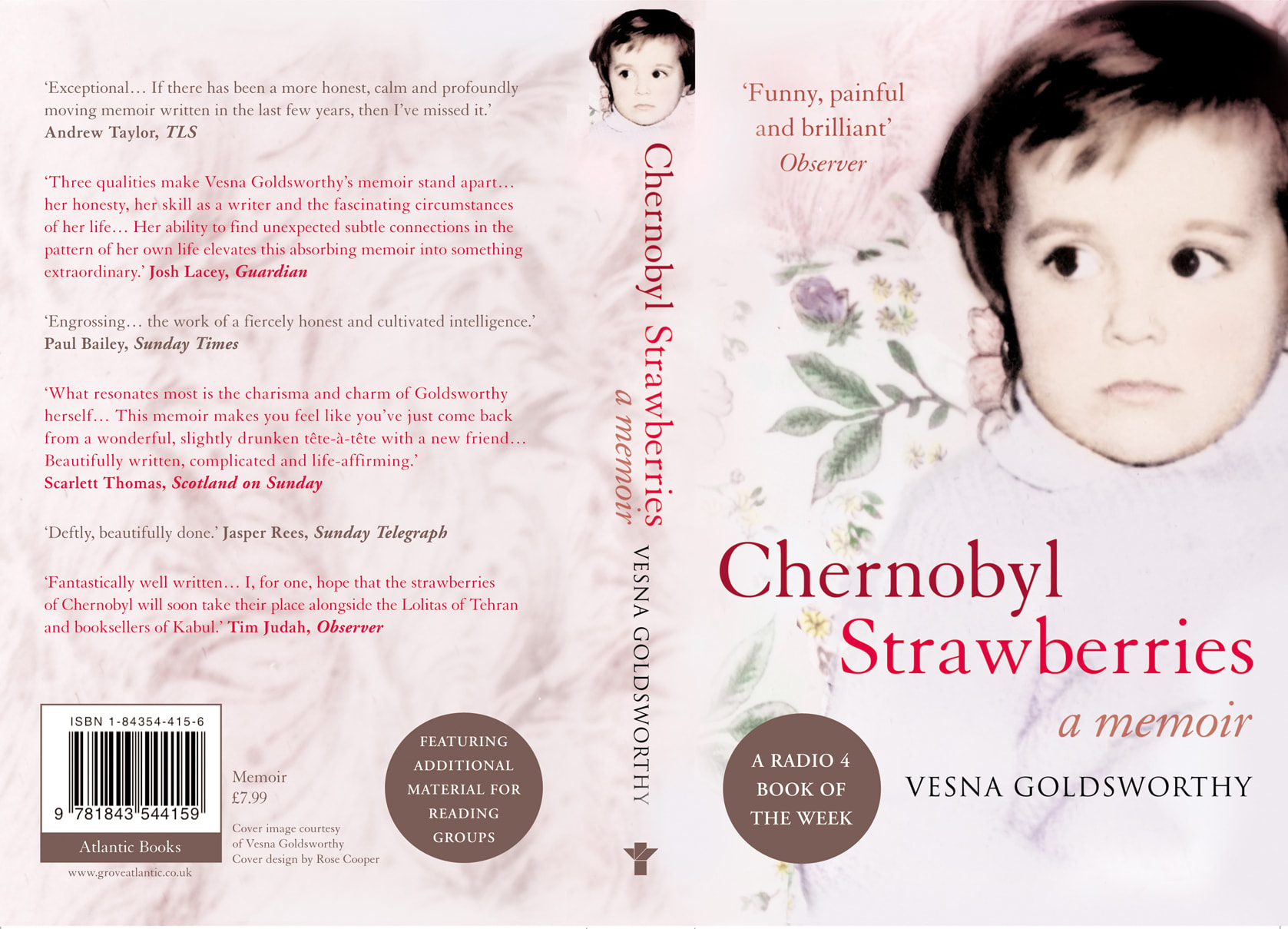
ベスナ・ゴールズワージーの“チェルノブイリのいちご”(チトー時代のユーゴスラビアでの成長伝記)は2005年にロンドンでアトランティックによってすばらしいレビューとともに発行されました。 それはタイムズとBBCの上で連載されました。 それは、多くの言語に翻訳されて、すぐ、ヨーロッパ中でベストセラーになりました。 ドイツだけでも14版がはっかんされました。
興味深いことに、それはチェルノブイリ爆発のおよそ20年後に発行されましたが、その災害はドイツの人々にとっていまだ生々しく心苦しいことだったということが言えます。彼女の出版社が、Heimweh nach Nirgendwoとして本を発行すると決めたほどです。 “どこにもない国へのホームシック”彼女の本からのこの一文は無くなった故国に対する彼女の気持ちを物語っています。
あなたの本の「チェルノブイリのいちご」、この本のインスピレーションはどこから来たんですか?
私が乳癌と診断されたとき、それを書きました。その時点で、あと余命6カ月があったと言われました。 私は当時まだ2歳だった息子のために私の幼年期と私の青春の話を書き留めました。私が来た東ヨーロッパの世界に関して何も知らない小さいイギリス人の少年として、母親なしに成長していくことに恐怖を覚えました。
また、私は私の病気とその原因について考え続けました。 チェルノブイリでの爆発はちょうど私の将来のイギリス人の夫が初めてベオグラードを訪問する週に起こりました。 初めは、爆発についてはとても少ない情報しかありませんでした。それは春でした、そして私たち2人はたくさんの新鮮ないちごとレタスを食べたことを覚えています。その年の雨には多くの放射線がありました。 私たちがその夏にヨーロッパの旅行したとき、各国は、ところどころに異なった禁止令がひかれていました。--ドイツでは、きのこを食べることができない、、イギリスでは、農業者は若いラムの肉が照射されたのでそれらを殺さなければなりませんでした。 私は、チェルノブイリが私の癌を引き起こしたとはいいませんが、本の題名を考えるときに、病気がその春に始まったという非常に強力なイメージであったので、-私が来た美しくて、また汚濁している世界の比喩として題名をつけたのです。
本のチェルノブイリのいちごを書くにはどれくらいかかりましたか?
面白いことに、私の初めての本は、書き上げるのに10年かかりました。二番目の本に当たるこのチェルノブイリのいちごは10ヶ月でかけました。
化学療法を受けていたときに書き始めましたが、それが非常に癒しであると感じられました。
私はよく、いろんなことを思い出しては、笑っていました。暗い現実であるにもかかわらず、そんなとてもおかしく、幸せな本であります。頭が禿げ上がった女が、キーボードに向かって笑い転げているのを見た私の家族は、どんな風に思っていたか想像もつきません。初めに、私は、それを発行することを考えてさえいなくて、私の健康が向上した後に、そうすると決めました。 多くの出版社がそれに関心があって、権利を得るために競争があったと聞いて、私は驚いていました。
あなたには、新しい本を書く計画がありますか?
私は、最近サロニカの天使と呼ばれる詩の本を完成しました、ユーゴスラビアの戦争、家族、記憶、外国人としてロンドンで暮らすことなどの本です。 それはクラショー賞(国際的な詩の賞)の選抜候補リストに入れられました、そして、それが今年発行されることを願っています。
この本は多くの言語で翻訳されました。 あなたの本のチェルノブイリのいちごは日本語で翻訳されますか?
いいえ、残念ながら。 日本に一度も行ったことがありませんが、私は日本の文化に非常に関心があります。 2、3年間、私は、私がベオグラード大学の比較文学の学生であったときに、日本語を勉強さえしましたが、ロンドンに移ったときやめてしまいました。 現在、それの大部分を忘れましたが、私はここ、ロンドンにまだ私の最初の「漢字の読み方」の本を持っています。 現在11歳であり、外国語を勉強するのが好きな私の息子が、私がしたようにいつか日本語に出会って勉強してほしいと思っています。
あなたは日本の読者に何かメッセージがありますか?
ニュースを見るほとんどの人々のように、私も毎日、日本について考えます。 福島で起こっていることは、とてもひどいです。そして、それはあまりに早く、壊滅的な被害をもたらした地震の後に来ました。 私の義理の兄弟(ニュージーランドに住んでいる)はクライストチャーチの地震で彼の家をなくしました、そのときは「これほどひどいことはない」といっていましたが、日本がそれとは比べ物にならないぐらいのことになってしまいました。 人はそのような荒廃で何を言うことができますか? 放射能漏れと戦っている人々のために祈っています。 また、すべてが一日も早く落ち着いて、自然が再びそれ自体を癒し始めることを願っています。
ベスナ・ゴールズワージー
英文学と創造ライティング教授
キングストン大学
Vesna Goldsworthy’s Chernobyl Strawberries, a memoir of growing up in Yugoslavia in Tito’s era, was published in London by Atlantic in 2005 to fantastic reviews. It was serialised in the Times and on the BBC. It was translated into many languages and soon became a bestseller throughout Europe. It had fourteen editions in Germany alone.
Interestingly, although it was published almost twenty years after the Chernobyl explosion, German memories of that disaster were still so raw and painful that her publisher decided to publish the book as Heimweh nach Nirgendwo
– Homesick for Nowhere – after a sentence from Vesna's book which describes her feelings for her lost homeland.
Please tell us about your book "Chernobyl Strawberries", what was your inspiration for the book?
I wrote it when I was diagnosed with breast cancer. At one point I was told I had six months left to live. I wrote down a story of my childhood and my youth for my son, who was only two at that time, fearing that – without his mother – he will grow up to be a little English boy knowing nothing about the East European world I came from.
I also kept thinking about my illness and its causes. The explosion in Chernobyl happened exactly in the week when my future English husband came to visit Belgrade for the first time. There was so little information about it at first, and, it was springtime and I remember the two of us eating tons of fresh strawberries and lettuce. I helped my mother to make some strawberry jam which we decided not to eat later, fearing it was irradiated. There was a lot of radiation in the rain that year. As we travelled across Europe that summer, each country had different bans in place – in Germany you were not allowed to eat mushrooms, in England farmers had to kill young lambs because their flesh was irradiated. I am not saying that Chernobyl caused my cancer, but I named the book after it because it begins with that spring,
and because it is such a powerful image – a metaphor of the beautiful, polluted world I came from.
How long did it take to write the book Chernobyl Strawberries?
Funnily enough, it took me ten years to write my first book, Inventing Ruritania and about ten months to write Chernobyl Strawberries (my second). I started when I was undergoing chemotherapy, and it felt very healing. I often laughed as I remembered various things. It is on the whole, in spite of its dark background, a very funny, happy book. I can’t imagine what my family thought seeing a bald woman laughing
over the keyboard. At first I did not even think of publishing it and decided to
do so only after my health improved. I was surprised to see so many publishers interested in it,
that there was a competition to get the rights.
Do you have plans to write new book?
I have recently completed a book of poetry called The Angel of Salonika, a book about war in Yugoslavia, family, memory, about being a foreigner in London. It has been shortlisted for the Crashaw prize (an international poetry prize) and I hope it will be published this year.
You book has been translated in many languages. Is your book Chernobyl Strawberries translated in Japanese?
No, sadly not. I have never been to Japan but I am very interested in its culture. For a couple of years, I even studied Japanese when I was a student of comparative literature at Belgrade University, but abandoned it when I moved to London. I’ve forgotten most of it now, but I still have my first Kanji no Yomikata here in London. I hope that my son – who is now eleven and loves studying foreign languages – will find it as magical as I did and want to study Japanese one day.
Do you have any message to readers in Japan?
Like most people who watch the news, I think about Japan every day. What is going on at Fukushima is so terrible – and it comes so soon after, and because of, such a devastating earthquake. My brother in law, who lives in New Zealand, lost his house in the earthquake in Christchurch and we were saying only last month “It couldn’t be worse”, and then Japan was so much worse that Christchurch seems almost kind by comparison. What can one say at such devastation? I pray for those people who are battling the radiation leaks and hope that it all stops soon, and nature starts to heal itself again.
Vesna Goldsworthy
Professor in English Literature and Creative Writing
Kingston University
Penrhyn Road
Kingston upon Thames KT1 2EE
United Kingdom




















※コメント投稿者のブログIDはブログ作成者のみに通知されます